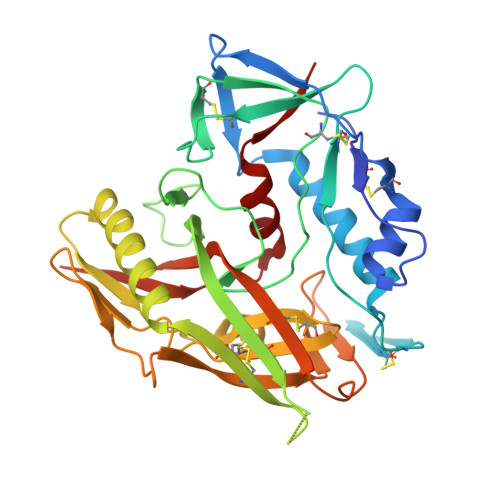Indoline CD4-mimetic compounds mediate potent and broad HIV-1 inhibition and sensitization to antibody-dependent cellular cytotoxicity.
Fritschi, C.J., Anang, S., Gong, Z., Mohammadi, M., Richard, J., Bourassa, C., Severino, K.T., Richter, H., Yang, D., Chen, H.C., Chiu, T.J., Seaman, M.S., Madani, N., Abrams, C., Finzi, A., Hendrickson, W.A., Sodroski, J.G., Smith III, A.B.(2023) Proc Natl Acad Sci U S A 120: e2222073120-e2222073120
- PubMed: 36961924
- DOI: https://doi.org/10.1073/pnas.2222073120
- Primary Citation of Related Structures:
8FLY, 8FLZ, 8FM0, 8FM2, 8FM3, 8FM4, 8FM5, 8FM7, 8FM8 - PubMed Abstract:
Binding to the host cell receptors, CD4 and CCR5/CXCR4, triggers large-scale conformational changes in the HIV-1 envelope glycoprotein (Env) trimer [(gp120/gp41) 3 ] that promote virus entry into the cell. CD4-mimetic compounds (CD4mcs) comprise small organic molecules that bind in the highly conserved CD4-binding site of gp120 and prematurely induce inactivating Env conformational changes, including shedding of gp120 from the Env trimer. By inducing more "open," antibody-susceptible Env conformations, CD4mcs also sensitize HIV-1 virions to neutralization by antibodies and infected cells to antibody-dependent cellular cytotoxicity (ADCC). Here, we report the design, synthesis, and evaluation of novel CD4mcs based on an indoline scaffold. Compared with our current lead indane scaffold CD4mc, BNM-III-170, several indoline CD4mcs exhibit increased potency and breadth against HIV-1 variants from different geographic clades. Viruses that were selected for resistance to the lead indane CD4mc, BNM-III-170, are susceptible to inhibition by the indoline CD4mcs. The indoline CD4mcs also potently sensitize HIV-1-infected cells to ADCC mediated by plasma from HIV-1-infected individuals. Crystal structures indicate that the indoline CD4mcs gain potency compared to the indane CD4mcs through more favorable π-π overlap from the indoline pose and by making favorable contacts with the vestibule of the CD4-binding pocket on gp120. The rational design of indoline CD4mcs thus holds promise for further improvements in antiviral activity, potentially contributing to efforts to treat and prevent HIV-1 infection.
Organizational Affiliation:
Department of Chemistry, University of Pennsylvania, Philadelphia, PA 19104.





















